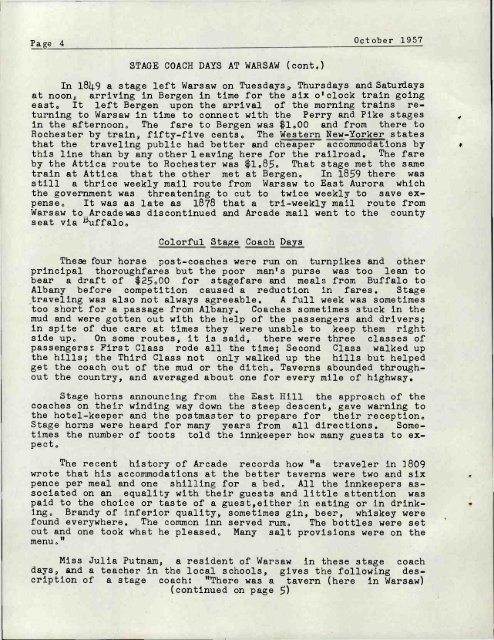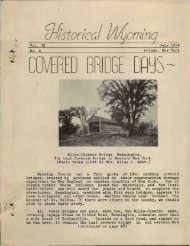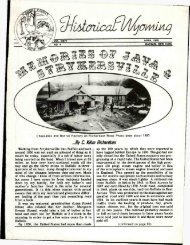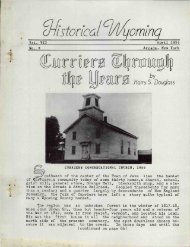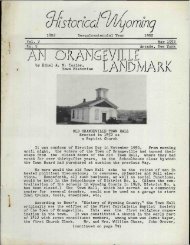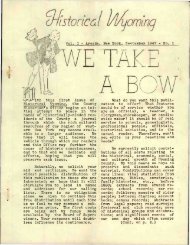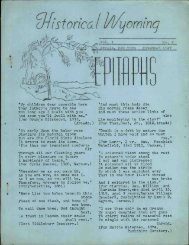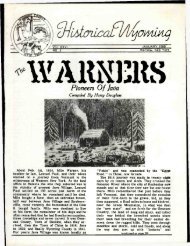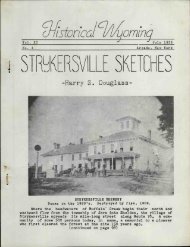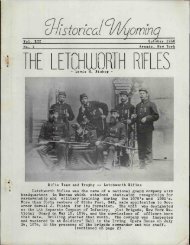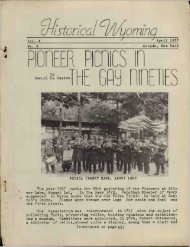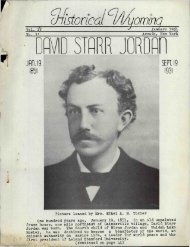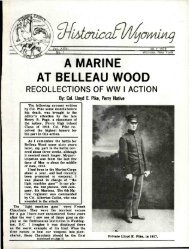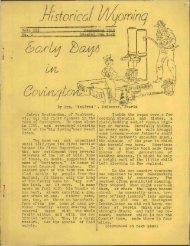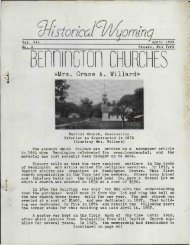cnistonca uomina - Old Fulton History
cnistonca uomina - Old Fulton History
cnistonca uomina - Old Fulton History
Create successful ePaper yourself
Turn your PDF publications into a flip-book with our unique Google optimized e-Paper software.
Page 2 4<br />
STAGE COACH DAYS AT WARSAW (cont.)<br />
October 1957<br />
In 18I4.9 a stage left Warsaw on Tuesdays^, Thursdays and Saturdays<br />
at noonj, arriving in Bergen In time for the six o'clock train going<br />
easto It left Bergen upon the arrival of the morning trains returning<br />
to Warsaw in time to connect with the Perry and Pike stages y<br />
in the afternoon0 The fare to Bergen was $lo00 and from there to<br />
Rochester by trains fifty-five cents0 The Western New-Yorker states<br />
that the traveling public had better and cheaper accommodations by »<br />
this line than by any other 1 eaving here for the railroad,, The fare<br />
by the Attica route to Rochester was $1085 That stage met the same<br />
train at Attica that the other met at Bergen,, In 1859 there was<br />
still a thrice weekly mail route from Warsaw to East Aurora which<br />
the government was threatening to cut to twice weekly to save expense<br />
„ It was as late as 1878 that a tri-weekly mail route from<br />
Warsaw to Arcade was discontinued and Arcade mail went to the county<br />
seat via B uffalo„<br />
Colorful Stage Coach Days<br />
These four horse post-coaches were run on turnpikes and other<br />
principal thoroughfares but the poor man's purse was too lean to<br />
bear a draft of $25o00 for stagefare and meals from Buffalo to<br />
Albany before competition caused a reduction in fares. Stage<br />
traveling was also not always agreeable„ A full week was sometimes<br />
too short for a passage from Albany„ Coaches sometimes stuck in the<br />
mud and were gotten out with the help of the passengers and drivers;<br />
in spite of due care at times they were unable to keep them right<br />
side upc On some routes, it is said, there were three classes of<br />
passengers?: First Class rode all the time; Second Class walked up<br />
the hills; the Third Class not only walked up the hills but helped<br />
get the coach out of the mud or the ditch. Taverns abounded throughout<br />
the country, and averaged about one for every mile of highway.<br />
Stage horns announcing from the East Hill the approach of the<br />
coaches on their winding way down the steep descent, gave warning to<br />
the hotel-keeper and the postmaster to prepare for their reception,,<br />
Stage horns were heard for many years from all directions. Sometimes<br />
the number of toots told the innkeeper how many guests to expect<br />
o<br />
The recent history of Arcade records how "a traveler in 3 809<br />
wrote that his accommodations at the better taverns were two and six<br />
pence per meal and one shilling for a bed. All the innkeepers associated<br />
on an equality with their guests and little attention was<br />
paid to the choice or taste of a guest9either in eating or in drinking.<br />
Brandy of inferior quality, sometimes gin, beer, whiskey were<br />
found everywhere. The common inn served rum. The bottles were set<br />
out and one took what he pleased. Many salt provisions were on the<br />
menu."<br />
Miss Julia Putnam, a resident of Warsaw in these stage coach<br />
days, and a teacher in the local schools, gives the following description<br />
of a stage coach; "There was a tavern (here in Warsaw)<br />
(continued on page 5)


